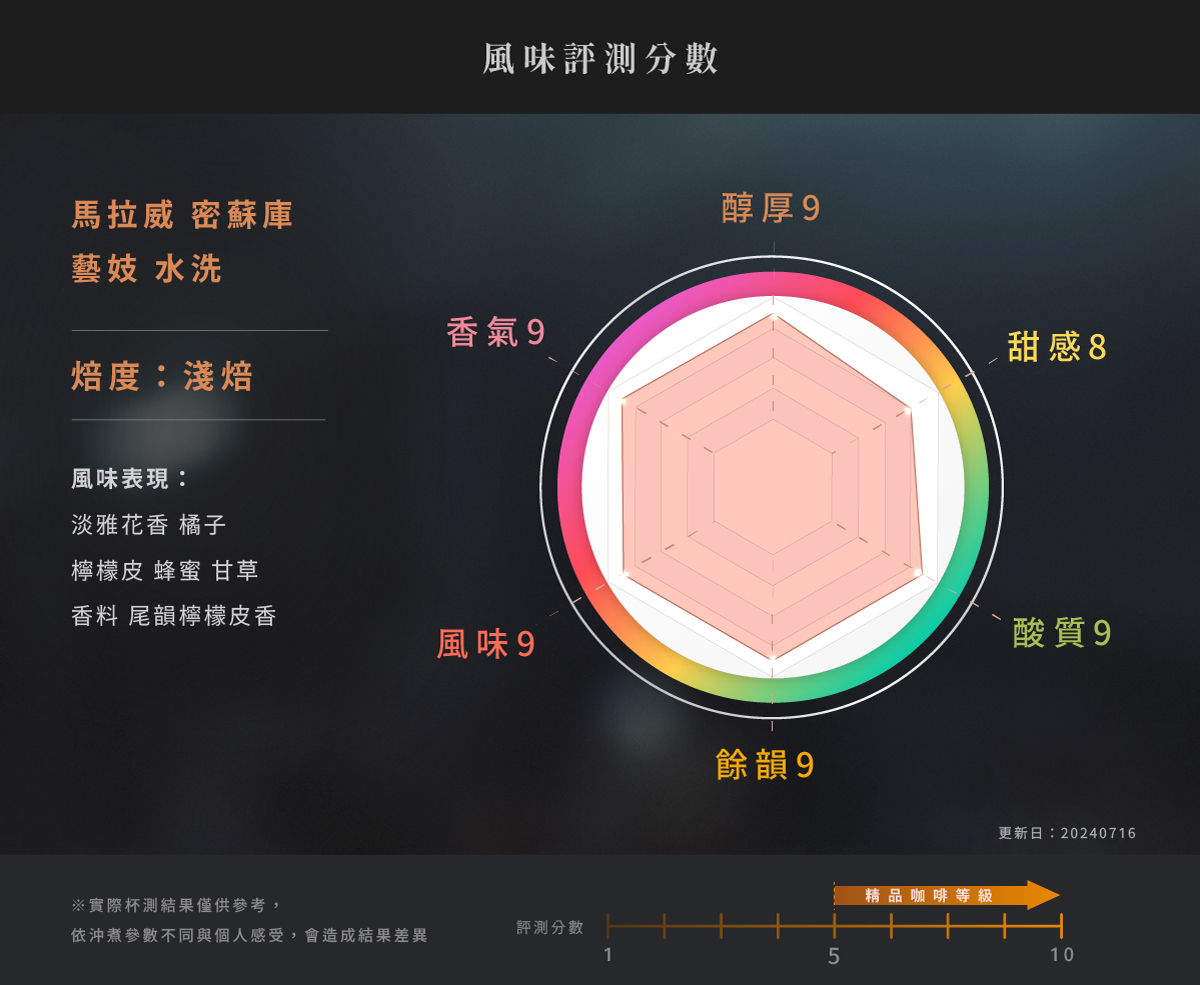

Malawi Misuku Mountain Geisha Washed








Coffee Flavor
The flavors of coffee are derived from the breakdown of various nutrients in the green coffee beans during roasting. Heat causes these compounds to degrade into a variety of aromatic molecular structures, resulting in a wide spectrum of flavors. High-quality coffee beans naturally possess a rich aroma that evolves at different temperatures—high, medium, and low—offering a delightful and nuanced experience worth savoring.
Malawi Misuku Mountain Geisha Washed
Delicate floral aroma, orange, lemon peel, honey, licorice, spices, with a lemon peel aftertaste

Despite Malawi being rated by the United Nations as one of the least developed countries in the world, the coffee here possesses a unique flavor, rich in sweetness and aroma. Local smallholder farmers cultivate coffee using the most traditional farming methods, resulting in sweet and delicate flavors, intense floral aromas, and a distinctive taste with hints of licorice and spices. Malawi is also a member of the Eastern Africa Fine Coffees Association (EAFCA) and promotes its coffee at the annual Specialty Coffee Association of America (SCAA) and Specialty Coffee Association of Europe (SCAE) exhibitions, gradually gaining the favor of coffee enthusiasts worldwide.
Malawi is located in southeastern Africa, an inland country bordered by Tanzania to the north, Zambia to the west, Mozambique to the east, and separated from Lake Malawi, Africa's third-largest lake. This vast natural territory boasts rich natural resources and a unique ecosystem.
Although Malawi's coffee industry faces funding shortages, it is gradually attracting attention in the global coffee market. Its Geisha coffee was introduced by neighboring Ethiopia in the mid-20th century and is now primarily grown in Malawi's highest quality production area—Misuku Mountain. With altitudes ranging between 1,700 and 2,300 meters, the region features abundant weathered bedrock rich in acidic content, with soils predominantly composed of deep brown to dark red clay and sandy soils. The climate is exceptionally suitable for growing Arabica coffee beans, with annual rainfall between 1,500 and 2,000 millimeters.
In Malawi, coffee is mainly cultivated by smallholder farmers, particularly concentrated in the northern Viphya and Nyika Plateaux regions. The coffee production area of Misuku Mountain, especially the Songwe River basin near the Malawi-Tanzania border, is a primary growing region for Arabica coffee. The coffee beans produced here, such as Agaro and Geisha, are renowned for their high quality and premium prices. These batches of coffee beans undergo four rounds of hand selection, ensuring that each bean is clean and full, thereby guaranteeing the highest quality.

Arabica Coffee Varieties - Geisha/Gesha
Geisha coffee, recognized by Forbes as one of the "Top Ten Most Expensive Coffees in the World," is a legendary variety well-known among specialty coffee enthusiasts. There is considerable confusion surrounding the Geisha variety because multiple genetically distinct plant types are referred to as Geisha, many of which share similar geographical origins in Ethiopia. Recent genetic diversity analyses conducted by the World Coffee Research Center have confirmed that the T2722 variety cultivated in Panama and its descendants are unique and consistent. When these plants are well-managed in high-altitude regions, there is a positive correlation with exceptionally high cup quality, and they are renowned for their delicate floral aroma, jasmine, and peach-like fragrance.
Regarding the name Geisha, the spellings "Geisha" and "Gesha" are often used interchangeably due to transliteration issues, as there is no fixed translation from Ethiopian dialects to English. The coffee was originally recorded with the spelling "Geisha" in cultivation records, and for decades, coffee researchers and cultivation databases have predominantly maintained this spelling, leading it to be first promoted and used within the coffee industry. This variety was initially collected from a mountain in Ethiopia, whose name is typically translated into English as "Gesha" or "Geisha."
In recent years, the cultivation of the Geisha variety has surged worldwide and has achieved outstanding results in major competitions, including in Central and South American countries such as Guatemala, Costa Rica, El Salvador, Colombia, and Peru, generally transplanted from the Panama T2722 variety. Additionally, many high-altitude regions in Taiwan have begun cultivating Geisha, with higher elevations typically producing more enchanting flavors.

(Coffee Processes)
Coffee processing refers to the transformation of ripe red coffee cherries into dried green coffee beans. Each method has its pros and cons, influenced by the natural environment and specific needs of the production region. Therefore, each coffee-producing area adopts processing methods best suited to its conditions. This batch uses the Washed Process, which are summarized below:
【Washed / Wet Processed】
Also known as the wet process, this method involves removing the skin and pulp of the coffee cherries before drying. The seeds are then fermented in water tanks to eliminate the remaining mucilage on their surface, followed by thorough washing and drying under sunlight or with mechanical dryers.
The washed process produces a cleaner and crisper flavor profile compared to the natural process. Coffees processed this way typically have lighter body, brighter acidity, and distinct fruit flavors. This method is often associated with specialty coffee due to its clarity and vibrant flavor expression.





JUSTIN INTERNATIONAL FOOD ENTERPRISE CO., LTD.
Tel: +886-3-358-6611
1st Floor, No. 30, Lane 120, Daxing Road, Taoyuan District, Taoyuan City
▶This product is covered by a NT$10 million product liability insurance.
▶Food Industry Registration Number: F-165601955-00000-0
▶ Our company’s cupper is certified as a CQI International Coffee Quality Appraiser.



Recommended Products


※ 詳細出貨及付款說明、發票、海外訂購須知...等,請 點擊進入